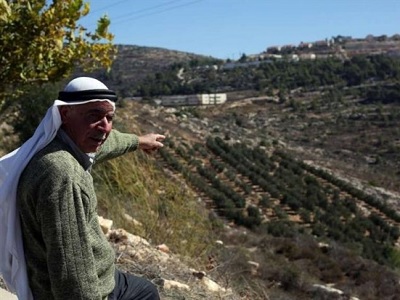
Israeli forces detained a Palestinian farmer on Friday afternoon, shortly after expelling several others from their lands while picking olives in the Nablus district of the northern occupied West Bank, according to Palestinian official, Ghassan Daghlas,
Daghlas who monitors settlement activities in the northern West Bank, added that Israeli forces detained 45-year-old Radwan Mutlaq Abu Laila. It remained unclear as to why Abu Laila was detained, or if he was released from Israeli custody.
Israeli forces also closed the Huwwara checkpoint in southern Nablus on Friday afternoon for a march that was being held by Israeli settlers from the nearby illegal Yitzhar settlement.
#Palestinian olive farmers struggle to survive https://t.co/lsYH6vcORo #BDS FREE #Palestine
— #JerusalemIsTheCapitalofPalestine (@HelenaKasp) October 25, 2016
The IOF prevented dozens of Palestinians from entering the town of Beita as the settlers protested the “vandalism” of large cinder blocks on the settlement’s property, which they said were spray-painted by local Palestinian youth.
Israeli forces detained two Palestinians, ages 17 and 20, on Tuesday as they were en route to pick olives in the village of Kafr Qaddum in the occupied West Bank district of Qalqiliya.
Murad Shtewei, coordinator of a local popular resistance committee, told Ma’an at the time that the two youths were stopped by Israeli forces on their way to go olive picking and were held for several hours before being transferred to an unknown location.
#Israeli Occupiers expelled #Palestinian farmers from their land during their olive harvesting in Deir al-Hatab Village E of Occupied Nablus pic.twitter.com/6Sy6rWOI5i
— Abbs Winston (@AbbsWinston) October 22, 2016
October, 22 marked the first day since the start of the olive-picking season in the occupied territory that Israeli forces allowed Palestinians from Kafr Qaddum to harvest their olive trees near the illegal Israeli settlement of Qadumim.
The start of the olive season this year has been marked by several incidents of such detentions, as well attacks on Palestinian farmers and their families by Israeli settlers, particularly in the northern Nablus and Qalqiliya districts.
Two weeks ago, dozens of extremist Israeli settlers harassed Palestinian families who were picking olives on their private lands west of Nablus city.
Zionist settlers attacked #Palestinian farmers while picking Olive in Burieen village south of #Nablus city. pic.twitter.com/seGwkfRWG8
— Days of Palestine (@DaysofPalestine) October 18, 2016
Daghlas told Ma’an at the time that settlers from the illegal Israeli outpost of Havat Gilad “attacked” different families from the villages of Jit and Farata in the Qalqiliya district, and Sarra in the Nablus district.
One week prior to that incident, a number of settlers from the illegal Eli settlement attacked Sahir Mousa and his family while they were picking olives on their land in the outskirts of the Nablus-area village of Qaryut, which is just a few kilometers away from the settlement.
“They arrived carrying hatchets and other sharp tools and forced the family to return home and completely damaged their car,” Daghlas said regarding that attack.
The Israeli occupation forces (IOF) on Tuesday morning prevented Palestinian farmers from picking olive harvests… https://t.co/CfD27yVFFH
— Team Palestina (@TeamPalestina) October 18, 2016
On October, 4, a group of Israeli settlers’ children escorted by Israeli forces harassed a Palestinian family harvesting olives in the southern occupied West Bank city of Hebron.
The Palestinian government has no jurisdiction over Israelis in the West Bank, and violent acts carried out by Israeli settlers often occur in the presence of Israeli military forces, who rarely act to protect Palestinian residents.
Israeli human rights group Yesh Din, along with Israeli rights group B’Tselem, have previously condemned Israeli authorities for failing to protect Palestinians from settlers violence or investigate attacks, particularly during olive harvest season, when incidents of attacks on harvesters and their olive groves have been a near daily occurrence in past years.
(MA’AN, PC)





